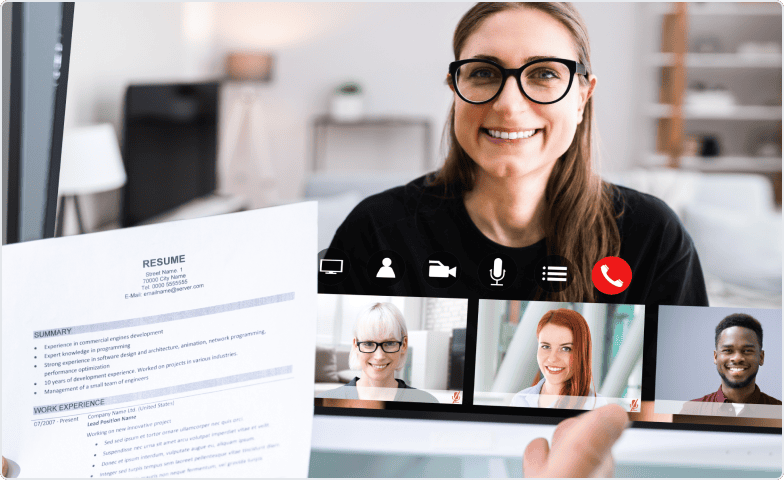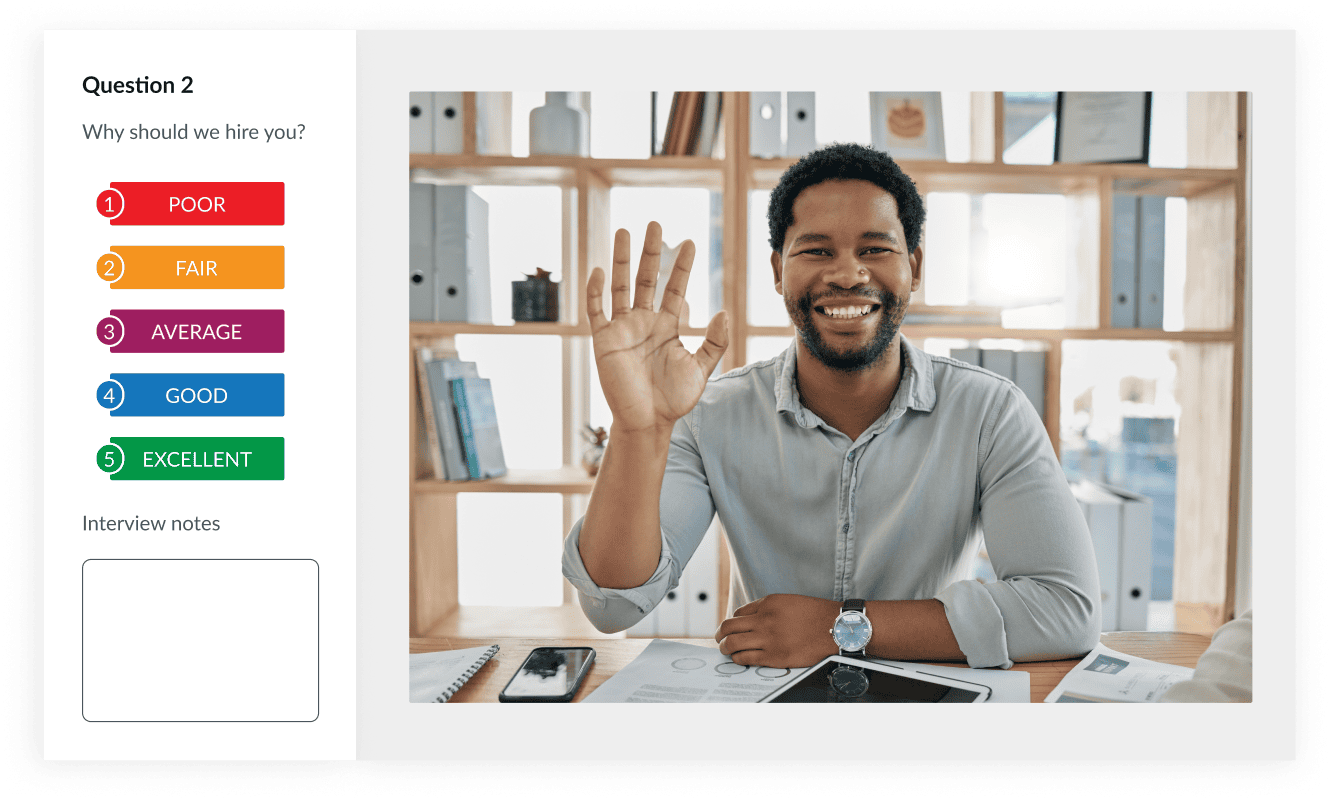
What You Should Know About Conducting a Screening Interview
Explore our expert guide to effective interview screening. Get professional tips, insights, and more.

Digital interviews have become the norm in most companies’ hiring processes. In fact, according to Indeed, 82% of employers have incorporated them in their hiring process.
Of course, usage varies across industries and job types (in-person vs. remote). But, given the prevalence of digital interviews, chances are you will be asked to participate in one, either as a candidate or as part of a hiring team.
Read on to learn about the format and top tips to master the art of the digital interview.
Digital interviews (a.k.a. virtual interviews) are conducted online using purpose-built or video-conferencing tools. Companies often use them in their hiring process to give them the flexibility to attract and evaluate top talent regardless of location. Digital interviews also facilitate enhanced data collection, record keeping, and process efficiencies, contributing to a more streamlined and data-rich recruitment program. They come in two varieties, live and pre-recorded:
What is an in-person digital interview?
A digital in-person interview closely resembles a traditional interview where candidates meet the interviewers face-to-face but with the interview ratings and notes captured in a digital interview platform. This approach not only ensures a consistent evaluation process across both in-person and video interviews but also creates a permanent record of the interactions. It facilitates a structured interview process, allowing for fair and direct comparisons among candidates.

Digital interviews offer many benefits compared to their traditional, on-site counterparts – both for employers and candidates. The most obvious one is that they can be conducted anywhere that participants have access to the internet.
For employers, this broadens the pool of candidates and removes travel or accessibility barriers and other geographic constraints. It also opens the doors to having a more diverse hiring committee consisting of employees in disparate locations. Applicants gain the added benefits of completing the interview from the comfort of their homes (or wherever they choose) and avoiding the stress of getting to the interview on time.
Pre-recorded interviewing software, which are often used in early screening stages, offer additional advantages:
All of these factors add up to a recruiting process that’s more efficient, accessible, and inclusive. Great for candidates and employers alike.
Artificial Intelligence (AI) and digital interviews
Recently, many companies have incorporated AI into their recruitment process, from resume reviews to video interview assessments. Not all digital interviews utilize AI but some do. Those platforms evaluate candidates by assessing their responses- some include additional criteria like body language, word choice, and tone of voice- to determine their suitability for the role.
Potential advantages: Making recruitment faster and more efficient with the possibility of reducing bias. AI assessment tools are programmed to focus on qualifications and avoid human preconceptions.
Potential risks and concerns: AI tools may inadvertently perpetuate or introduce bias. They could lead you to breach anti-discrimination laws since the tools learn from preexisting data, which may contain inherent biases, rather than formulating independent thought. AI evaluations may also be inconsistent or opaque, sometimes based on criteria completely irrelevant to the job. There are also legal considerations around areas like data security and privacy, as well as ethical considerations and candidate transparency.
Best practices for AI in recruitment are evolving, but with 88% of companies globally already using some form of AI in HR (SHRM), it’s a trend that appears to be here to stay.
When it comes to digital interviews, the short answer is to prepare exactly how you would an on-site interview. While video interviewing may feel more casual because interviews can take place at home, candidates should approach them with the same level of planning and professionalism they would for traditional interviews…and then some.
Check out these video interview tips for detailed guidance about how to ace a digital interview, but here are a few key considerations.

While there are a lot of similarities between live and pre-recorded digital interviews, the latter is a newer approach that many job seekers haven’t encountered before. So before diving into tips that apply to all digital interviews, here’s an overview of what to expect:
In some cases, once the pre-recorded session starts, there may be very little flexibility, so take extra care in preparing for this format.
The reality is that questions asked during digital interviews, live and pre-recorded, mirror questions asked during on-site interviews. That’s because regardless of format or location, employers are fundamentally trying to assess a candidate’s skills, experience, personality, and cultural fit.

The exact questions will vary based on the stage (initial screening vs. final round), the interviewer (recruiter, hiring manager, colleague, senior leader), and the employer’s approach to hiring. But some of the most common digital interview questions include:
Be prepared to give brief and compelling answers to these questions. Include specific examples of success, overcoming adversity, and meeting or beating goals.
Write these stories down, and practice delivering them succinctly and with enthusiasm. It may sound silly, but this additional preparation will help you eliminate nervousness and go into the interview with confidence.
Before heading into any digital interview, take the time to ensure that the software and equipment needed are available and working. If possible, test them days in advance and again 30 minutes before the interview.

Here are a few tech tips:
Taking time to test known variables will eliminate unnecessary stress heading into digital interviews. Still, technological snafus happen even with the best preparation, so don’t get rattled if they arise.
What to wear in digital interviews is a fairly easy question to answer. Make sure to dress professionally. That doesn’t mean you need to suit up for every interview. In fact, depending on the company culture or the role, wearing a suit might backfire.
But even for the most casual of companies, it’s always a good approach to present a well-groomed, professional look (i.e., no t-shirts or tank tops). Also, avoid busy prints and bright colors. They typically don’t translate well on webcams.

When it comes to setting, the most important consideration is finding a place void of distractions. You want to be focused on the questions, delivering great answers, and building rapport. Pick a location that’s quiet, and turn off or mute devices and messaging applications. Make sure family and roommates are aware of the interview and don’t disturb you. Lock pets in a different room or have someone keep them occupied.
Two other things to consider are lighting and background. Avoid placing windows behind you because you’ll be backlit and look like someone in a witness protection program. Instead, opt for lighting sources in front or above you.
Make sure your background is clutter-free and professional (e.g., no piles of laundry or tables in disarray). You can certainly show something that reflects a bit of your personality or interests but not in a distracting way.
Regardless, test your camera view beforehand, make adjustments, and if all else fails, go with a virtual background.
Remember that all the suggestions above are meant to prepare you for what to expect, reduce your apprehension, and allow you to shine in digital interviews. However, the most important rule with any type of interview is to relax and just be yourself.
Best of luck as you work to land your next role!

The length of digital interviews depends on many factors, including the type of position, the stage of the interview process, and employer preferences. Generally, they last anywhere from 20 minutes to an hour. Pre-recorded interviews typically include five to 10 questions, with a few minutes to respond.
Based on the platform used and employer preferences, candidates may be able to re-record answers, but in many cases, you will only get one take. Read the instructions in the invitation email to know your options before getting started.
After you submit a pre-recorded interview, you should receive an automatic confirmation email that will often provide insights into what will happen next and how soon you should hear back from the employer. During live interviews, feel free to ask about the next steps at the end of the interview. Also, sending a follow-up email thanking interviewers for their time, reinforcing your interest in the position, and explaining why you’re a good fit is a nice touch.
Modernize your hiring process with expert insights and advice.